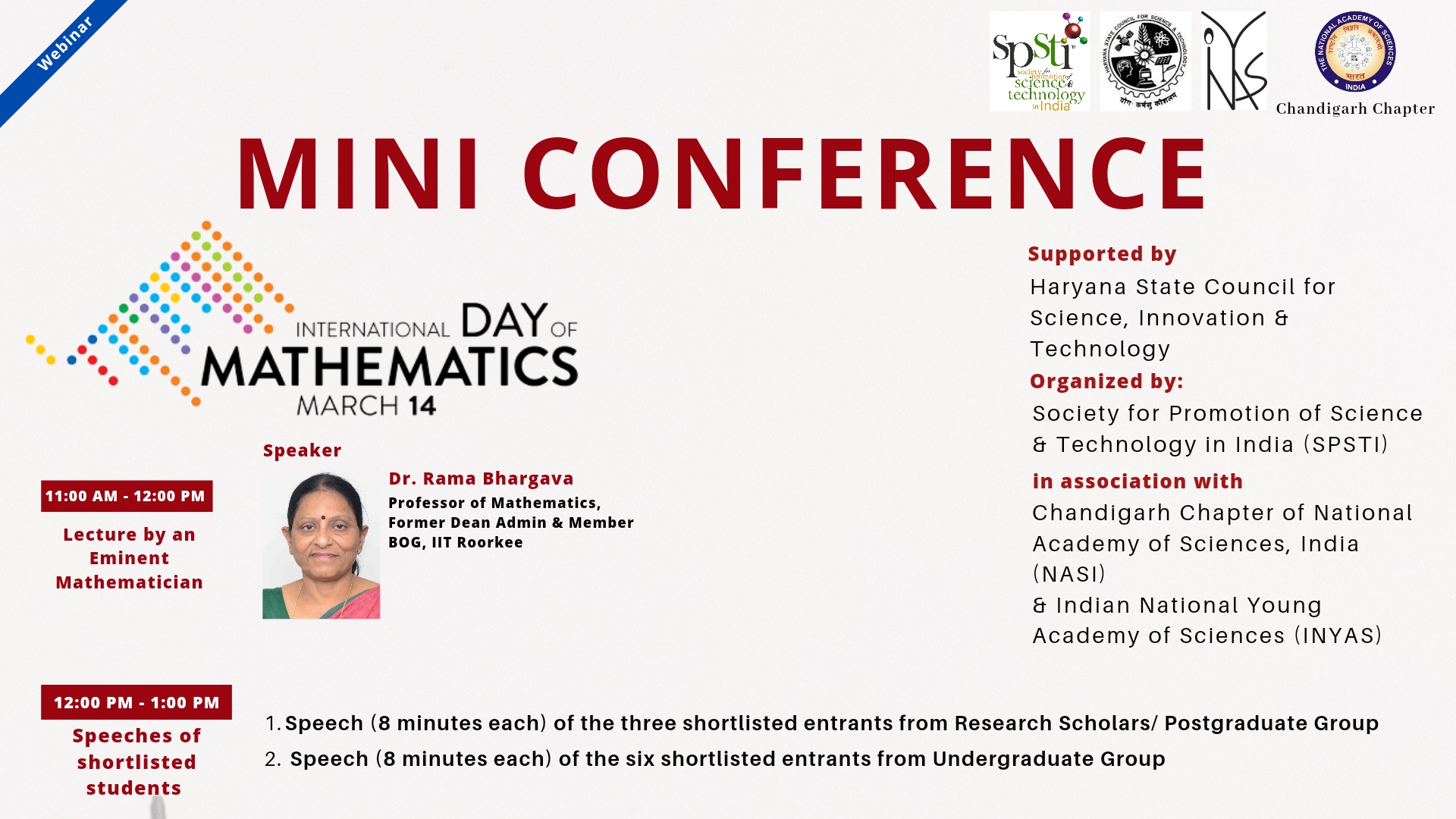The Society for Promotion of Science & Technology in India (SPSTI) in association with Chandigarh Chapter of National Academy of Sciences, India (NASI) and Indian National Young Academy of Science (INYAS) with support from Haryana State Council for Science, Innovation & Technology organized a mini conference on International day of Mathematics, on Sunday, March 14, 2021 at 11:00 AM through online platform. The lecture was attended by students, teachers and members of the general public. The lecture was live from Zoom platform with more than 45 attendees and many viewed on the Facebook page of SPSTI from various places all over the country.
The event included lecture by eminent mathematician Dr. Rama Bhargava, Professor of Mathematics, former dean admin and member BOG at IIT, Roorkee. She talked on ‘Exploring the potential of Mathematics’. The second part of the event included speeches by shortlisted students of the undergraduate group and students of postgraduate and research scholars as another group. Prof. Passi is credited for the conception of the idea of this mini conference including lecture and speeches by selected students from various universities. The webinar was steered by Prof. Keya Dharamvir, General Secretary, SPSTI and she welcomed all attendees. Dr. Sugandha Maheswary, Secretary, INYAS gave a brief overview of the event. Ms. Rajni Bhalla introduced the speaker, Prof. Rama Bhargava.
Prof. Bhargava began her session with the simple question if life is possible without air, water or food and then relating the same question if any society can sustain and develop without mathematics. She quotes words of Leonardo Da Vinci citing the impotence of mathematics in our life as no knowledge can be certain if it is not based upon Mathematics. She also told the day, March 14, being celebrated as Pi day and also is the birth day of great scientist Albert Einstein. She explained mathematics is related with all other subjects like physical and life sciences, social science, computer sciences, manufacturing, marketing, entrepreneurship and many more. Talking about nature of mathematics she explained it is the science of discovery which involves intuitive methods and is abstract science. It is an intellectual subject and tool subject having its own integrity, beauty, and structure. Mathematics has its own language which has its own language and symbols and does not need other languages to explain and understand it. Mathematics is logic governed by a pattern of deductive proof and the conclusions drawn are well defined as black and white, with no midway. She says ‘God is a mathematician’ and mathematics is abstract, symbolic, structured and precise and its laws cannot be violated and have attributes like God eternal, omnipresent and omnipotent. She quoted many mathematicians who in some fashion compared mathematics with His creations. Aims of mathematics include developing discipline, recreation and utilization of leisure, developing scientific attitude and aesthetic sense, social, cultural, moral, intellectual, psychological development and practical use. She further shred the contribution of certain great mathematicians like Euclid for proof of Pythagorean theorem, Euclid’s secondary theorem, Pythagoras for discovery of irrationals, inventing Pythagorean theorem, and mathematical term like parabola and ellipse, Aryabhata for place value symbols, knowledge of symbols and sign of zero, and method of addition, subtraction, multiplication and division, Bhaskaracharya for Kuttaka methods, two different methods of multiplication, concept of infinity, arithmetic and geometric progression and fundamentals of Rolle’s theorem, Ramanujan for divergent series, work on partial sums and products of hypergeometric series. Mathematics is based on data analysis and physical process. She shared mathematics is embedded in our daily life and is inseparable citing various examples like cooking, kitchen accessories, interior designing, gardening, symmetry in nature, yoga, telecommunication, sports, architecture, drawing, dance, music, engineering, various subjects like bioinformatics, cheminformatics, computational biology, computational physics, quantum commuting, radio waves, big theory general theory of relativity, Planck’s quanta, black holes, antimatter, quarks and much more. Mathematics also has application in predicting tsunami, hurricane, weather forecasting, etc. There is hardly any field where mathematics does not come into picture. She also talked about Fibonacci numbers in nature and golden ratio. She said the goal of mathematics is to improve the minds of learners with ability to reason precisely and analytically about abstract structure with logical decisions. She ended her talk by saying life is mathematics where humans in their ‘brackets’ try to ‘add and multiply’ the experience and make their ‘equations’ using ‘subtraction and division’ while the ultimate truth is ‘zero’.
Her session followed with questions and discussion about studying mathematics and its application in research, complexity of mathematics in nature and the way humans have understood it and applied it for many inventions. The session was much appreciated by the audience, and followed with the speeches by shortlisted students of undergraduate, postgraduate and research scholars.
The competition was held online where videos were invited from the applicants in two groups, group 1 which included undergraduate and group 2 which included postgraduate studies and research scholars on the topics Mathematics – The queen of all sciences, Mathematics in real life, Beauty of abstract mathematics and Role of Mathematics in digital era. 32 entries were received and the selection panel selected 6 entries from group 1 and 3 were selected from group 2. The selection panel included Dr. Sayeed Abbas, Prof. Keya Dharamvir, Ms. Rajni Bhalla and Dr. Sugandha Maheshwary. The selected students from both the categories presented their paper. In group 1, Upasana secured the first position, followed by Rajni at second and Anubhav at position third. In group 2, Hushanpreet secured first position followed by Bharti at position second and Ramanpreet at third position.
The session concluded with Shri Dharam Vir, IAS (Retd.) & President SPSTI, sharing his experiences with mathematics as a student and also, he presented vote of thanks to the speaker and audience.

